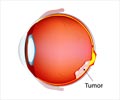Demonstration of new research findings shows the possibility to provide cancer tumours harmless without disturbing the other cells and tissues in the body.

Researchers at Lund University have now found a connection between two proteins that in different ways control cell division and the possibilities for a cancer tumour to develop. The retinoblastoma protein obstructs cell division and is absent in most types of cancer tumour. The new findings show that its absence leads to an increase in another protein, gamma-tubulin, which, when present in high levels, encourages the development of cancer tumours. However, if gamma-tubulin is blocked, the tumour cells die while the healthy cells survive.
The researchers are now looking for substances that can stop the effect of gamma-tubulin on cell division. This could form the basis for a new drug that works on various types of cancer and has a low risk of side effects if the substance is directed to the right place. This is because it is only the tumour cells that die.
"I judge the chances of finding a basis for a drug to be good, partly because there are already substances that block 'cousins' of gamma-tubulin", says Maria Alvarado-Kristensson, a researcher at Lund University, who believes that, if all goes well, a drug could be ready for initial tests on patients, known as 'phase 1 testing', in 5-6 years' time.
In the study, tissue and genetic material from patients with various different types of cancer were studied: breast cancer, bladder cancer, small-cell lung cancer, colon cancer and eye cancer. The two proteins were seen to play an important role in all these diseases and the protein is also found in a number of other types of cancer tumour.
"It is exciting to have research findings that are significant for several common types of cancer. This means that many patients will be affected if our work proves successful", says Maria Alvarado Kristensson.
Advertisement
Source-Eurekalert














